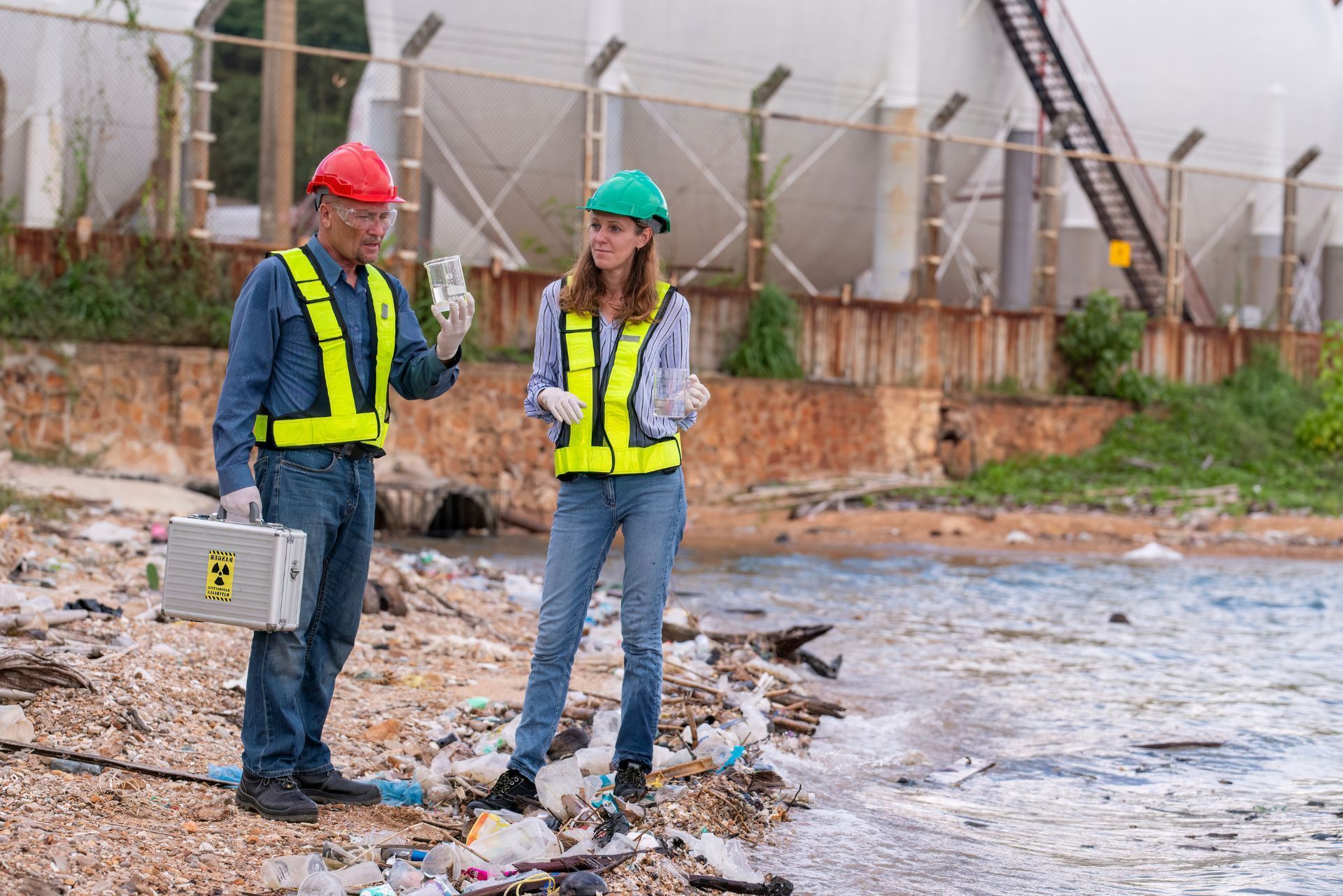Top 3 Recommended Policies

In today’s business landscape, environmental responsibility and waste management are more than just regulatory requirements—they are critical components of sustainable operations. Yet, despite growing awareness, approximately 80% of companies still do not purchase environmental insurance, a statistic that has remained steady since 2018. This reluctance leaves many businesses vulnerable to significant financial risks associated with environmental liabilities. Understanding the nuances of environmental and waste management business insurance is essential for companies seeking to protect themselves against potential contamination claims, regulatory penalties, and cleanup costs. This article explores everything you need to know about this specialized insurance sector, the challenges it faces, and why it is becoming increasingly important.
Why Environmental Insurance Matters for Waste Management Businesses
Environmental insurance is designed to cover risks related to pollution, contamination, and other environmental damages that can arise from business operations. For waste management companies, these risks are particularly pronounced due to the nature of their work, which involves handling, transporting, and disposing of waste materials that may be hazardous or toxic.
Despite the clear risks, many businesses overlook environmental insurance, often due to cost concerns or a lack of awareness. However, the consequences of not having adequate coverage can be severe. Cleanup costs, legal fees, and regulatory fines can quickly escalate, potentially threatening the financial stability of a company.
David Dybdahl, founder of the American Risk Management Resources Network, highlights the complexity of environmental insurance by stating, “Pollution exclusions are the most litigated words in the history of insurance.” This underscores the importance of carefully understanding policy terms and ensuring comprehensive coverage to avoid costly disputes.
With the Environmental Protection Agency (EPA) recently announcing over $1 billion in funding under President Biden’s Bipartisan Infrastructure Law to clean up more than 100 Superfund sites, environmental accountability is more in focus than ever. This federal investment signals increased regulatory scrutiny and the potential for more stringent liability standards for businesses involved in waste and environmental management according to Alera Group, Inc.
Moreover, the growing public awareness of environmental issues has led to heightened expectations from consumers and stakeholders alike. Businesses are increasingly being held accountable not just for their operational practices, but also for their environmental impact. This shift in perception means that waste management companies must not only comply with regulations but also demonstrate a commitment to sustainability and responsible waste handling. Companies that invest in environmental insurance can showcase their dedication to protecting the environment, which can enhance their reputation and build trust with clients and the community.
Additionally, the landscape of environmental regulations is continuously evolving, with new laws and standards being introduced to address emerging environmental challenges. For instance, the rise of e-waste and the need for proper disposal of electronic devices have prompted regulatory bodies to implement stricter guidelines. Waste management businesses that are proactive in securing environmental insurance are better positioned to navigate these changes, ensuring they are not only compliant but also resilient against potential liabilities that may arise from unforeseen incidents or regulatory shifts.

Key Risks and Challenges in Environmental and Waste Management Insurance
Waste and recycling companies face unique challenges when it comes to insurance coverage. The insurance market for these industries remains difficult due to limited capacity and a rise in both the frequency and severity of claims. This has led to increased premiums and stricter underwriting criteria, making it harder for businesses to secure adequate protection.
One of the biggest hurdles is the expansion of contamination exclusions in insurance policies. As Dybdahl notes, “More underwriters keep coming up with new ways to exclude contamination... as the exclusions expanded.” This trend complicates the ability of companies to obtain coverage that truly protects against environmental liabilities. Furthermore, as environmental regulations become more stringent, companies are often left scrambling to adapt their operations and insurance policies to meet new compliance standards, which can be both time-consuming and costly.
Moreover, the global waste management market was valued at approximately $330 billion in 2022, reflecting the scale and complexity of the industry. With such a vast market, the potential environmental impact is significant, and insurance providers are increasingly cautious about the risks they assume according to WIFI Talents. The interplay between economic growth and environmental sustainability creates a challenging landscape for insurers, who must balance the need to support industry growth while managing their own risk exposure.
Common Environmental Risks in Waste Management
Some of the most common risks waste management businesses face include:
- Soil and groundwater contamination from improper waste disposal
- Air pollution from emissions or landfill gases
- Accidental spills or leaks during transportation
- Non-compliance with environmental regulations leading to fines
- Third-party claims for property damage or bodily injury caused by pollution
Insurance policies tailored to these risks can provide financial protection and peace of mind, but only if the coverage is comprehensive and clearly understood. Companies must also be proactive in implementing risk management strategies, such as regular training for employees on safe waste handling practices and investing in technology that monitors environmental impact. By fostering a culture of environmental responsibility, businesses can not only mitigate risks but also enhance their reputation in an increasingly eco-conscious market.
Additionally, the rise of emerging contaminants, such as microplastics and pharmaceuticals, presents new challenges that traditional insurance models may not adequately address. As scientific understanding of these pollutants evolves, waste management companies must stay informed and adapt their practices accordingly. This dynamic environment necessitates a collaborative approach between insurers and waste management firms to develop innovative coverage solutions that address these evolving risks while ensuring sustainable operations.
Types of Environmental Insurance Coverage Available
Environmental insurance is not a one-size-fits-all product. Different policies cater to various aspects of environmental risk, and businesses must carefully evaluate their needs to select the right coverage.
Some common types of environmental insurance include:
- Pollution Liability Insurance: Covers third-party claims for bodily injury and property damage caused by pollution incidents.
- Cleanup Cost Cap Insurance: Provides coverage for remediation costs exceeding a pre-agreed limit, often used in real estate transactions.
- Contractor’s Pollution Liability: Designed for contractors who may cause pollution during their operations.
- Storage Tank Insurance: Covers leaks or spills from underground or aboveground storage tanks.
Given the complexity of these policies, working with knowledgeable brokers and risk managers is essential to ensure that all potential exposures are addressed. Additionally, businesses should consider conducting regular environmental audits to identify any changes in their operations that may affect their risk profile. This proactive approach not only helps in selecting the appropriate insurance coverage but also demonstrates a commitment to environmental stewardship, which can enhance a company's reputation in the eyes of stakeholders.
The Impact of Regulatory Changes on Insurance Needs
Regulatory frameworks continue to evolve, increasing the pressure on businesses to maintain compliance and manage environmental risks proactively. The EPA’s recent initiatives, including the allocation of more than $1 billion to clean up Superfund sites, highlight the federal government’s commitment to environmental remediation and enforcement.
This regulatory environment means that businesses without adequate environmental insurance may face not only cleanup costs but also substantial fines and legal expenses. As regulations tighten, insurance policies may also evolve to reflect new risks and liabilities, making it critical for companies to stay informed and regularly review their coverage. Furthermore, as public awareness of environmental issues grows, businesses may find themselves facing increased scrutiny from consumers and advocacy groups. This heightened awareness can lead to reputational risks that go beyond financial implications, making it essential for companies to not only comply with regulations but also actively engage in sustainable practices that mitigate their environmental impact.
The Growing Role of Sustainability in the Insurance Industry
The insurance industry itself is becoming more engaged in sustainability efforts. In 2022, the global insurance sector invested approximately $250 billion in green bonds, signaling a strong commitment to supporting environmentally responsible projects and companies according to WIFI Talents.
This shift reflects a broader trend where insurers are not only managing environmental risks but also actively promoting sustainable business practices. For waste management companies, this can translate into better access to insurance products that reward environmental stewardship and risk mitigation efforts. Insurers are increasingly recognizing that businesses that prioritize sustainability are less likely to face catastrophic losses, thus creating a win-win scenario for both parties.
However, despite this positive trend, the insurance market remains challenging for waste and recycling businesses due to the inherent risks involved. Companies that invest in sustainable operations and demonstrate strong environmental controls may find more favorable terms and conditions from insurers. Moreover, insurers are beginning to offer specialized products tailored to the unique needs of these businesses, which can include coverage for innovative technologies aimed at reducing waste or enhancing recycling processes.
Addressing Environmental Pollution in Developing Regions
Environmental insurance is particularly crucial in developing countries where waste management infrastructure may be less developed. Approximately 33% of urban waste in these regions is openly dumped, contributing significantly to environmental pollution and public health risks according to WIFI Talents. The lack of proper waste disposal systems not only endangers the environment but also exacerbates social inequalities, as marginalized communities often bear the brunt of pollution-related health issues.
For businesses operating in such environments, environmental insurance can provide a vital safety net against unforeseen liabilities and help support efforts to improve waste handling and disposal practices. By securing this type of coverage, companies can invest in necessary infrastructure upgrades, training programs for employees, and community engagement initiatives aimed at fostering sustainable practices. Additionally, insurers may offer incentives for businesses that implement innovative waste reduction strategies, thus encouraging a more comprehensive approach to environmental responsibility that benefits both the company and the community at large.

How to Choose the Right Environmental Insurance for Your Business
Selecting the appropriate environmental insurance coverage requires a thorough understanding of your business’s specific risks and exposures. Here are some key steps to guide the process:
- Conduct a Risk Assessment: Identify potential sources of pollution and environmental damage related to your operations.
- Review Regulatory Requirements: Understand local, state, and federal regulations that may impact your liability and insurance needs.
- Consult with Experts: Work with insurance brokers and environmental risk specialists to evaluate available policies and exclusions.
- Compare Coverage Options: Look beyond price to assess the scope of coverage, including exclusions, limits, and claims handling procedures.
- Plan for the Future: Consider potential changes in regulations and business operations that may affect your insurance needs over time.
By taking these steps, businesses can better protect themselves against environmental liabilities and ensure long-term operational resilience. Additionally, it is crucial to stay informed about emerging environmental issues that could impact your industry, such as climate change, resource scarcity, and shifts in public policy. For instance, industries heavily reliant on natural resources may face increased scrutiny and regulatory changes that necessitate more comprehensive insurance coverage. Keeping abreast of these trends can help you anticipate future risks and adjust your insurance strategy accordingly.
Moreover, engaging in proactive environmental management practices can not only mitigate risks but also enhance your company's reputation. By demonstrating a commitment to sustainability and environmental stewardship, businesses can attract environmentally conscious consumers and investors. This proactive approach may also lead to potential discounts on insurance premiums, as insurers often reward businesses that take steps to minimize their environmental impact. Therefore, integrating environmental considerations into your overall business strategy can yield both financial and reputational benefits, making it an essential aspect of choosing the right environmental insurance.
Conclusion: The Imperative of Environmental Insurance in Waste Management
Environmental and waste management business insurance is no longer optional—it is a critical safeguard against the growing risks of pollution, contamination, and regulatory enforcement. With a significant portion of companies still lacking this coverage, there is a pressing need for greater awareness and proactive risk management.
The challenges in securing adequate insurance are real, especially given the expanding exclusions and increased claims in the waste and recycling sectors. However, the evolving regulatory landscape and the insurance industry’s growing focus on sustainability create opportunities for businesses that prioritize environmental responsibility.
Ultimately, investing in comprehensive environmental insurance not only protects a company’s financial health but also supports broader efforts to promote sustainable waste management practices. As the industry continues to evolve, staying informed and engaged with insurance developments will be essential for businesses committed to environmental stewardship and long-term success.
For more insights on environmental insurance trends and regulatory updates, resources like
Insurance Business America offer valuable information tailored to industry professionals.
Contact Us
Phone
Location
9595 Six Pines Dr, Suite 8210, The Woodlands, TX 77380

